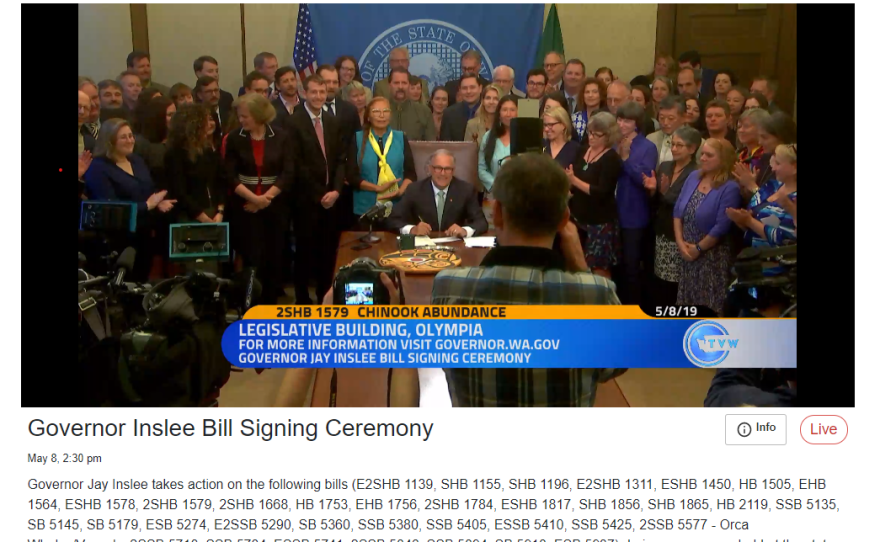“For as the orca go, so go we.”
Those were words from Gov. Jay Inslee as he signed five bills that aim to help keep endangered Southern Resident killer whales from going extinct. All are based on recommendations from the orca recovery task force he convened last year.
Inslee said there is still more work to be done in the next legislative session, but that the accomplishments so far give him hope for the future of Washington’s iconic endangered whales.
The first bill he signed addresses oil spill prevention. It closes a loophole and requires previously exempt barges to have tug escorts. It also directs state agencies to develop the best safety measures for oil transport through Rosario Strait, Haro Strait, Boundary Pass, and other areas of Puget Sound and the Salish Sea that both oil tankers and orcas frequent.
“A large oil spill would devastate our orcas, the environment, tribal treaty rights and the economy,” Inslee said. "Protection of Southern Resident orcas has been one of my top priorities and this bill helps them having a fighting chance.”
The other orca recovery bills he signed address noise and disturbances from vessels, contaminants in the water that affect orca health and the lack of Chinook salmon, the whales’ primary food source.
After the signing ceremony, the governor declared June "Orca Action Month" for the third year running. It’s meant to raise awareness for the issues affecting the iconic killer whales. The Puget Sound Southern Resident population has dropped to just 75 in the wild.
BIG WINS FOR SALMON
Orca advocates and other supporters joined Inslee on the steps of the rotunda to celebrate the new policies, which they say represent real progress.
“We were thrilled to see the Legislature address orca recovery needs this session. And, in particular, salmon recovery,” said Mindy Roberts, Puget Sound Director for Washington Environmental Council and a member of the governor’s task force.
One of the bills signed gives the state Department of Fish and Wildlife more authority to enforce Washington’s hydraulic code and protect shoreline habitat that salmon need from development. Roberts says salmon habitat needs have been chronically underfunded in the past. The new budget allocates more than $560 million for restoration and acquisition of Chinook habitat.
There’s also significant funding in the state budget to boost hatchery production of Chinook, provisions to increase spill over the Columbia River dams to help juvenile fish survive on their way out to sea, and $750,000 to convene a roundtable to discuss the needs of stakeholders if four dams on the lower Snake River were removed, to give Chinook access to pristine habitat upstream.
“I think we saw really unprecedented policy wins in that space and I think overall the bills really put us on a better path – for people and for salmon – and for orcas,” Roberts said.
She says spending on salmon recovery is by far the most expensive part of the package. But she says it’s still not fully funded. “We’re also still leaving dozens of shovel ready projects on the table.”
Lists of priority habitat restoration work, suggested by local and regional experts, remain unaddressed. Figuring out how to fund those will be critical as the task force resumes its work this year. Also looming large, Roberts says, is how to factor in the impacts of climate change.








